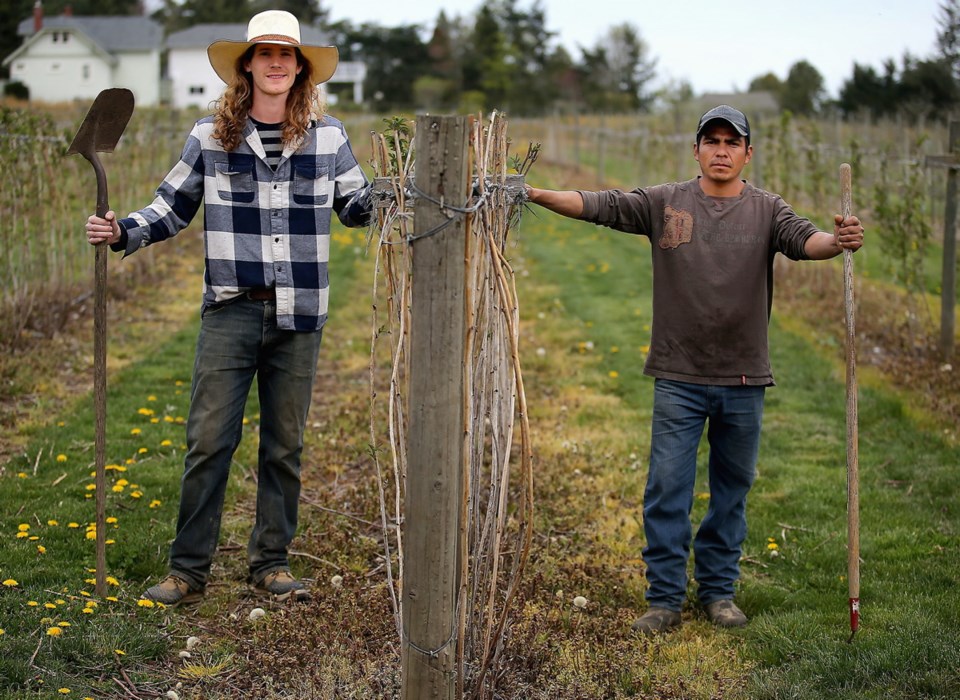Terry Michell was expecting to have a dozen temporary foreign workers planting and harvesting vegetables on his Central Saanich farm by mid-April, but he’s still not sure when or if they’ll arrive.
He has hired some local students and others who have lost work due to the COVID-19 crisis, but he’s worried that if his foreign workers don’t arrive, crops could go to waste.
“We plant 30 different crops on a farm [with] up to 450 acres of veggies. That takes a lot of manpower to harvest, pick and wash,” said Michell, who owns Michell’s Farm Market.
“We’re pretty much on schedule for planting, but when it comes time to harvest, if we don’t have a harvester, then it’ll be expensive fertilizer.”
Each year, B.C. farms employ about 10,000 temporary foreign workers from Mexico and other countries. Some workers arrived before travel restrictions were put into place, but for the past month and a half, it has been much more difficult for farm owners to bring in foreign workers.
“It’s very stressful,” said Dan Ponchet, who owns Dan’s Farm in Central Saanich, a 50-acre property that grows broccoli, cauliflower, strawberry, kale and parsley. “Everybody is having an issue getting their workers.”
Ponchet is lucky to have one foreign worker who arrived before the pandemic hit and a second who landed in Vancouver last week and will self-isolate in Richmond for two weeks, but his crew is still short-handed, and, like Michell, he doesn’t know when more help will arrive.
“We’re just hoping that it’s going to be early May,” said Ponchet, who has been hiring foreign workers for 13 years. He has a regular crew from Mexico that comes back year after year and is highly skilled for the challenging work.
Ponchet said under normal conditions, it’s difficult to find locals willing to do the job because it’s demanding and not as highly paid as other physical work, though he has managed to hire a few people locally to fill in this season.
Other farm operators are struggling to fill positions, despite rising unemployment due to the COVID-19 crisis.
Michell said he has had some response to job postings, but not as many applicants as he expected.
Rob Galey of Galey Farms said his farm isn’t turning anyone down for a job. “People who want a job, it’s here.”
Galey has managed to find some local people to work on the farm, but many of the students he hired have since turned down the job because of new financial supports from the government, which has been frustrating.
He said the labour shortage means the farm is “way behind” on weeding and pruning, with more than 100,000 strawberry plants waiting in a cooler to be planted. “We’re doing the best we can day-by-day with limited resources,” he said.
None of his foreign workers has confirmed flights to Canada and Galey doesn’t know when they could arrive. “I don’t count on it until somebody sends me their flight tickets.”
Nearly 160 workers from Mexico landed in Vancouver on Wednesday, the first temporary foreign workers to arrive in more than a month. They were met by health workers and Ministry of Agriculture staff and screened for symptoms on arrival, said B.C. Agriculture Minister Lana Popham.
They were then transported by bus to hotels near the airport, where they’ll self-isolate for 14 days in accommodation paid for by the provincial government.
“At the end of that, we will oversee them being transported to the farms where they’re going to be working,” Popham said.
She said the flight, one of many arriving this month, brought relief to the industry.
“These planes that are filled with workers are like planes filled with superheroes right now. Because we really appreciate the fact they’re willing to come here,” she said.
About 1,000 workers are expected by the end of April, and several thousand more in the next couple of months.
Popham said the province is trying to ensure as many workers as possible can travel to B.C.
The industry should be able to recover from the delay, she said. “As long as we can receive them, we can catch up by working extra hard.”
With many British Columbians out of work due to the crisis, Popham is hoping to see an increased interest in agricultural work and an emphasis on buying B.C. products.
“It’s really, really important for consumers right now to buy B.C. agricultural goods,” she said. “Everything we’re growing here, processing here, adding value to here, if people could make an extra effort to buy B.C. right now, it would certainly help us all.”



